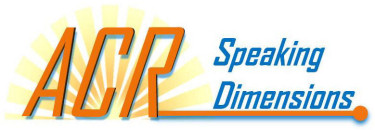Services provided by ACR Speaking Dimensions
ACR Speaking Dimensions is a company that provides services primarily to children with speech-language impairments. A speech or language impairment refers to a communication disorder in the area of language, articulation, fluency, and voice. A speech or language impairment may be congenital or acquired. A child may exhibit one or any combination of speech or language impairments. ACR specializes in children ages birth to 21 years old, utilizing an individualized plan with both long-term goals and short-term goals established for each child’s needs, as well as adult services for Accent Modification, Support Services, and It Takes Two to Talk® The Hanen Program for parents.
 We utilize a variety of qualitative and quantitative assessment methods including standardized tests, informal assessments, and child/parent interviews in order to analyze and diagnose the nature and extent of speech-language impairments.
We utilize a variety of qualitative and quantitative assessment methods including standardized tests, informal assessments, and child/parent interviews in order to analyze and diagnose the nature and extent of speech-language impairments.
Speech-language services may be provided individually or within groups, depending upon the setting (educational or clinical) and individual’s diagnosis and needs. ACR’s goal is to give children the communication skills needed to be successful in their homes, educational settings, communities, and throughout all other life experiences.
The programs that will be offered in both the educational and clinical settings are: Language Program (LP), Speech Program (SP), and Fluency Program (FP). The Accent Modification Program (AMP), Support Groups (SG), and Early Intervention Support Services (EISS). The EISS will only be offered in our clinical setting.
Below is a summary of what each program has to offer:

Language Program (LP)
Language Disorder is an impairment in the area(s) of semantics (word meanings), syntax (order of words), phonology (the sound system of words) morphology (construction of words), and pragmatics (social skills). The Language Program covers all of the areas of language or just one specific component. The purpose of this program is to assist children in their ability to comprehend as well as express language skills across all language environments.

Speech Program (SP)
A Speech Sound Disorder is an atypical production of speech sounds characterized by errors of substitutions, omissions, additions, distortions. It can also include phonological processes, a motor speech component, or other issues such as oral-motor structural abnormalities. Speech Sound Disorders adversely affects intelligibility throughout conversational speech. The Speech Program is designed to decrease or remediate articulation errors and/or increase intelligibility throughout conversational speech. Oral motor exercises/activities (activities that relate to tongue, lip, jaw positioning and movement) may be included depending on the nature of the impairment.

Fluency Program (FP)
Fluency Disorder is an impairment interrupting the “flow of speech” in the form of repetitions, hesitations, prolongations (stretching sounds), blocks and secondary behaviors such as increased facial tension, head movements, noisy breathing, foot tapping, etc. The Fluency Program is designed to increase fluent speaking by learning how speech is produced and sustained, identifying stuttering patterns and how to change them, and utilizing fluency enhancing strategies to become a more effective communicator.

Accent Modification Program (AMP)
This Accent Modification Program is specialized to improve/increasing intelligibility in individuals (child or adult) with strong accents/dialects. The concentration will be placed on making distinctive modifications in prosody, intonation, and consonant production. This program is designed to enhance the effectiveness of communication exchanges across a variety of settings (i.e. workplace, school, community, etc.)

Social Skills Groups (SSG)
Groups (2 or more) that will focus on providing opportunities for children with social communication impairments/disorders, Autism Spectrum Disorder, or unspecified social interaction deficits to generalize the social skills that they are learning with other individuals. Social themes will be geared toward the groups’ needs. Activities will involve interactive social stories, role playing, and other functional activities. These services will be offered twice monthly.

Early Intervention Support Services (EISS)
The support services is an early intervention service that will focus on techniques families can use in the home and during naturally-occurring activities to facilitate language growth and improved social language interaction. An experienced speech-language pathologist will educate the parents on appropriate and effective ways of engaging their children to improve their overall communication skills. Parents and their children will participate in group activities designed to assist with the generalization of communication skills across settings empowering both children and their parents. Participants will receive materials and/or activities they can take home and immediately use in the home to make learning engaging for the entire family.
